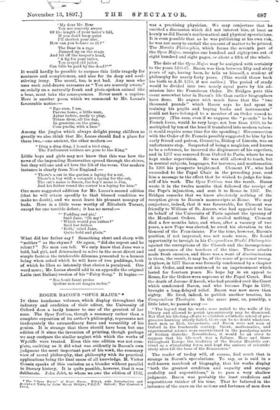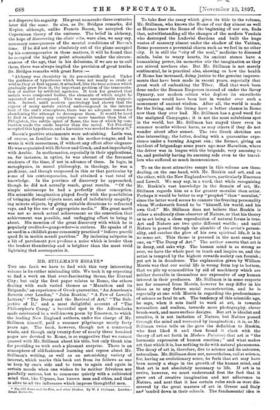ROGER BACON'S "OPUS MAJUS." *
IN these handsome volumes, which display throughout the industry and erudition of their editor, the University of Oxford does a tardy honour to one of the greatest of her eons. The Opus Tertium, though a summary rather than a complete exposition of its author's philosophy, represents not inadequately the extraordinary force and versatility of his genius. It is strange that there should have been but one edition of it since the invention of printing, though perhaps we may confpare the similar neglect with which the works of Wycliffe were treated. Even this one edition was not com- plete, omitting as it did what was evidently in Bacon's own judgment the most important part of his work, the summary view of moral philosophy, that philosophy with its practical applications being the final cause of all knowledge. M. Victor Cousin speaks of this omission as a blunder without parallel in literary history. It is quite possible, however, that it was deliberate. John Jebb, to whom we owe the edition of 1732, • The Opus Mains" of Roger Bacon. Edited, with Introduction and
Analytic 11 Table, by John Ileory Bride, Oxford : The Olarend Pre:ra.
was a practising physician. We may conjecture that he omitted a discussion which did not interest him, at least as keenly as did Bacon's mathematical and physical speculations. It is even possible that as he was publishing at his own risk,
he was not sorry to curtail the amount of matter to be printed. The Moralis Philosophia, which forms the seventh part of the Opus Majus, occupies one hundred and eighty-two out of eight hundred and eight pages, or about a fifth of the whole.
The date of the Opus Majus may be assigned with certainty to the years 1266-67. Bacon was then between fifty and sixty years of age, having been, he tells us himself, a student of philosophy for nearly forty years. (This would throw back his birth to A.D. 1210, if not earlier.) The period of study would be divided into two nearly equal parts by his ad- mission into the Franciscan Order. Dr. Bridges pats this event somewhat later in Bacon's life than earlier biographers have done. He argues with much force that the "two thousand pounds" which Bacon says he had spent in training his pupils and buying books and instruments" could not have belonged to a member of an Order vowed to poverty. (The sum, even if we suppose the " pounds " to be French lions, would be very large, not less than £650, to be multiplied by ten at the least if translated into modern values : it would require some time for the spending.) His connection with the Order of St. Francis possibly suggested to him by his early friend and patron, GrosstUe, Bishop of Lincoln, was an unfortunate step. Suspected of being a magician, and known to be a reformer, he incurred the displeasure of his superiors,
and in 1257 was removed from Oxford to Paris, where be was kept under supervision. He was still allowed to teach, but in neutral subjects, languages, for instance, and mathematics. In 1266 his prospects brightened. Clement IV., who had
succeeded to the Papal Chair in the preceding year, sent him a message to the effect that he wished to judge for him- self of his work. The Opus Tertium was the result. Bacon
wrote it in the twelve months that followed the receipt of the Pope's injunction, and sent it to Rome in 1267. Dr. Bridges remarks that we know absolutely nothing of the reception given to Bacon's manuscripts at Rome. We may conjecture, indeed, that it was favourable, for Clement was friendly to William of St. Amour, who had appealed to him on behalf of the University of Paris against the tyranny of the Mendicant Orders. But it availed nothing. Clement died a few months later, and when, after a vacancy of two years, a new Pope was elected, he owed his elevation to the
General of the Franciscans. For the time, however, Bacon's position, if not improved, was not made worse. He found opportunity to inveigh in his Compendium Shall. Philosophiie against the corruptions of the Church and the incompetence and ignorance of the teachers of the time. These attacks made fresh enemies, and there was a want of discrimination in them, the result, it may be, of the sense of personal wrong. Anyhow, in 1277 Bacon was formally condemned by a chapter
of his Order, and was sentenced to an imprisonment which lasted for fourteen years. No hope lay in an appeal to Rome, for the Orders were supreme at the Papal Court. But the death of Jerome d'Ascoli, who had presided ovek the Court which condemned Bacon, and who became Pope in 1288, brought a long-delayed relief. Bacon was now more than eighty. He lived, indeed, to publish another treatise, his
Compendium Theologice. In the same year, or, possibly, a little later, he passed away :— " The legend that his works were nailed to the walla of the library and allowed to perish ignominiously may be dismissed. But that his life-long efforts to establish a Catholic school of pro- gressive learning utterly failed, there can be no doubt whatever. Such men as Rich, Grosseteste, and Bacon were not seen at Oxford in the fourteenth century. Greek, mathematics, and experimental science were overwhelmed in the paralysing mists of Scotian dialectic, Nevertheless, it would be an error to suppose that his life-work was a failure. Here and there throughout Europe the tradition of the Doctor Mirabilis sur- vived as a stimulating force, and kept the embers of scientific study alive till the time of the Renascence."
The reader of to-day will, of course, find much that is strange in Bacon's speculations. To say, as is said in a
well-known text-book of biography, that his works display "both the greatest erudition and sagacity and strange credulity and superstitions," is to pass a very shallow judgment. Bacon was probably the least credulous and superstitious thinker of his time. That he believed in the influence of the stars on the actions and fortunes of men does
not disprove his sagacity. His great namesake three centuries later did the same. So also, as Dr. Bridges remarks, did Kepler, although, unlike Francis Bacon, he accepted the Copernican theory of the universe. The belief in alchemy,
the hope of discovering the elixir vitm, were also, we may say, necessary consequences of the mental conditions of Bacon's time. If he did not rise absolutely out of the plane occupied by his contemporaries in these matters, it will be found that he occupied the highest point attainable under the circum- stances of the age, that in his delusions, if we are so to call them, there was always implied the prevision of great truths.
Dr. Bridges remarks with great force
Alchemy was chemistry in its pre-scientific period. Under the guidance of hypotheses which were not nearly so crude or wild as they at first appear, it attacked, like the true science which gradually grew from it, the important problem of the transmuta- tion of matter by artificial agencies. It took for granted that metals were compound bodies, the elements of which might be separated and recomposed. This was no unreasonable supposi- tion. Indeed, until modern spectrology had shown that the vapour of many metals existed undeeomposed in the intense heat of the sun's atmosphere, there was no adequate reason for abandoning the attempt to decompose them. It would be hard to find in alchemy any conjecture more baseless than that of Phlogiston, the subtle spirit of flame, the loss of which by com- bustion made the oxide heavier than the metal. Yet Priestley accepted this hypothesis, and a Lavoisier was needed to destroy it."
Bacon's positive attainments were astonishing. Latin was, of course, as familiar to him as his mother-tongue, and he wrote it with correctness, if without any effort after elegance.
He was acquainted with Hebrew and Greek, and not improbably with Arabic. In mathematics, especially in their applications, as, for instance, in optics, he was abreast of the foremost students of the time, if not in advance of them. In logic, in metaphysics, in moral philosophy, in theology, he was a proficient, and though surpassed in this or that particular by
some of his contemporaries, had attained a vast total of knowledge. In the province of discovery he approached,
though he did not actually reach, great results. "Of the simple microscope he had a perfectly clear conception. His scientific imagination played freely with the possibilities of bringing distant objects near, and of indefinitely magnify- ing minute objects, by giving suitable directions to refracted rays, and by the use of appropriate media." His great merit was not so much actual achievement as the conviction that achievement was possible, and unflagging effort to bring it about. His mention of the great discovery with which he is popularly credited—gunpowder—is curious. He speaks of it as used in a childish game commonly practised " ludicro puerili quod fit in rankle mundi partibus." By inclosing saltpetre in a bit of parchment you produce a noise which is louder than the loudest thunderclap and is brighter than the most vivid lightning that accompanies it.







































 Previous page
Previous page